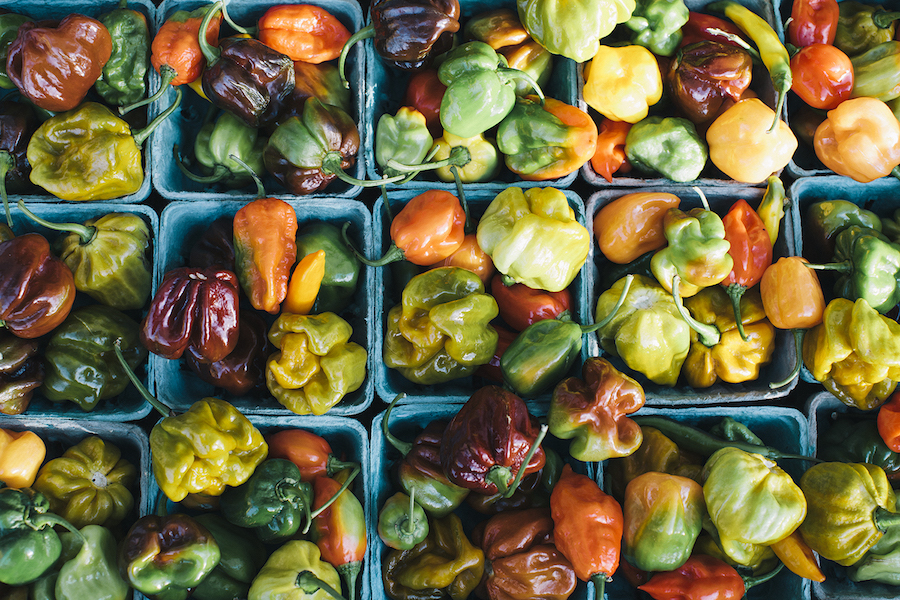Take the 3 train to the penultimate stop on a summer Saturday. The barren roofscapes you see from the elevated track don’t hint that you’re entering the neighborhood with the most community gardens in the city. But walk down Livonia Avenue under the tracks, and the scene changes: there are gardens on every block, some threatening to spill through their fences, others tamed into neat raised beds. Follow signs for the farmers market—the hand-painted signage on the fence, the tempting smells and the reggae/R&B/salsa mix. Round the corner onto Schenck and you’ve found the heart-beat of this community, in the midst of the impromptu dance party, the Caribbean breakfast specialties, the hot peppers ranging across the rainbow (and Scoville scale), and the young people proudly hawking their greens and bitter melon.
The market is run by East New York Farms!, a partnership between United Community Centers (UCC) and neighborhood residents to address food justice by promoting local sustainable agriculture and community-led economic development. Founded in 1998, almost a decade before The Omnivore’s Dilemma helped to popularize sustainable food nationally and, well, before Brooklyn became synonymous with artisanal pickles, East New York Farms! was far ahead of the local food trend—because growing food together turned out to be an excellent way to organize the community.

East New York, today squarely in Mayor Bill de Blasio’s sights as he pilots his redevelopment plan, struggled for decades with municipal neglect. The area lost about a third of its population to white flight in the 1960s and 1970s. Hundreds of vacant houses were torn down in the years following; the lots were abandoned to trash, filled with rubble and weeds—until many were reclaimed by neighbors and transformed into gardens. In addition to having the most community gardens, East New York is also number one in New York City food stamp participation and obesity, and has the fewest grocery stores per resident.
Not about to wait for help that was not forthcoming from the city, neighborhood residents partnered with the Pratt Center for Community Development in the mid-1990s to create solutions for their needs based on existing resources. Problems identified included a lack of activities for youth and a lack of healthy food options and green space. Meanwhile, energetic young people made up a third of the neighborhood population and there were all those gardens—at least 65 of them—as well as the extensive knowledge base of the mostly Caribbean and African American gardeners who had been growing produce there for years.
East New York Farms! has been matching assets to needs ever since, building a thriving youth farming training program, two popular farmers markets, four urban farm sites, a CSA and support for a broad network of community and backyard gardeners. Most importantly, consistent with the 60-year organizing history of its parent UCC, the organization has spent nearly two decades investing in the people of East New York, building trust and authentic relationships through its programming.

Each spring, 21 youth interns ages 13 to 15 are selected from local middle schools and begin work with staff, older peers and dozens of neighborhood gardeners. Many of the teens take the internship for the stipend it offers. For most, as they learn to plant, spread compost for their neighbors, think critically about their food options and taste the literal fruits—and vegetables—of their labors, it becomes much more than a job.
Aaron Leon, 21, spent four years in the internship program. Now a junior at Brooklyn College, he applied at his father’s suggestion and stuck with it because, he points out pragmatically, “On a résumé, it shows stability to be somewhere for four years.” He pauses and adds, “I stayed because of my supervisors and coworkers. It was like a second home.”

A key element of the youth program—and of the success of ENYF! overall—is involvement with established East New York gardeners. Gardeners hail from the Caribbean, the American South, Bangladesh and West Africa. They share growing techniques, seeds, tools and labor, learning from each other and teaching the youth, who work in their gardens as part of the internship.
At the Saturday farmers market, the solidarity inherent in any agricultural community is evident: gardeners collaboratively run stands selling produce they have grown together; vendors and customers from East Asia and the Caribbean exchange recipes for bitter melon; customers bring seeds back from trips home to share with growers. When a stand’s supply of grapes or sweet potato vines runs out, sometimes a customer will step behind the counter so the gardener can go harvest more.
Youth and adults work together to set up and take down the market each week, and youth sell food they have grown alongside consignment from gardeners—even just a few bunches of collard greens or a peck of peaches. East New York–grown produce is supplemented by Alex’s Tomato Farm from Schoharie County, as well as baked goods, jams, herbal medicines and crafts all made by East New York entrepreneurs.
Before 18-year-old Domica Roberts’s three years as an intern, she used to walk by the ENYF! youth farm and think “it was for other people.” But like so many others, it didn’t take her long to feel like part of the ENYF! community. Roberts, now a rising sophomore at City College, talks of learning about food miles, propagation and discovering the taste of figs and fresh tomatoes on the farm, but what she loved most was being able to nourish her neighbors. “I’m growing something that someone who lives here will buy and eat, and it will make them happy,” she says. “I’m making that person happy.”



